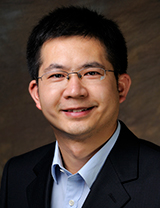
- This event has passed.
MEAM Seminar: “CRISPR-Programmed Microfluidic Devices for DNA Detection, Computing and Digital Display”
September 3, 2024 at 10:15 AM - 11:15 AM
CRISPR is a gene editing technique that allows researchers to quickly and precisely edit genome sequences. Beyond gene editing, CRISPR-Cas systems can be repurposed as a programmable platform for other various applications. In this talk, I will introduce how we use CRISPR technology to program microfluidic devices for DNA detection, DNA computing and digital display. First, I will present our advancements in investigating simple, sensitive and specific CRISPR assay technologies for DNA detection. Second, I will discuss how to integrate CRISPR assay with microfluidics technology to develop affordable and programmable microfluidic diagnostic systems for infectious disease detection and cancer diagnostics. Third, I will describe how we program CRISPR and DNA to develop paper-based microfluidic devices for DNA computing and digital display. Overall, by combining the programmability of CRISPR with the integration capability of microfluidics, we can develop next-generation tools not only for biomedical diagnostics, but also for information technology.

Changchun Liu
Professor of Biomedical Engineering, University of Connecticut
Changchun Liu is a professor in the Biomedical Engineering Department at the University of Connecticut Health Center (UConn Health). He received his Bachelor’s degree in Applied Chemistry, and Master’s in Organic Chemistry from Yunnan University, China. He obtained his Ph.D. in Physical Electronics at the Institute of Electronics, Chinese Academy of Sciences, China. Prior to joining UConn Health, he worked as a postdoctoral researcher and research faculty in the Department of Mechanical Engineering & Applied Mechanics, University of Pennsylvania. He has an interdisciplinary background and training spanning Engineering (i.e., biomedical, electronic, mechanical), Chemistry and Biotechnology. Dr. Liu’s research interests include the development of synthetic biology, CRISPR technology, microfluidics technology, biosensors, and their biomedical applications with a focus on point-of-care molecular diagnostics of infectious diseases and cancers. He was a recipient of the NIH Career Development Award (K25), the Penn One Health Award, and the W.W. Smith Charitable Trust Research Award.
